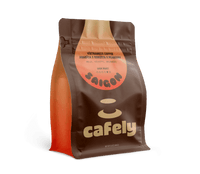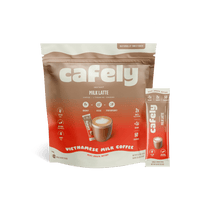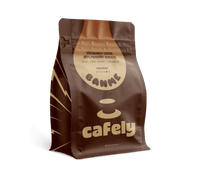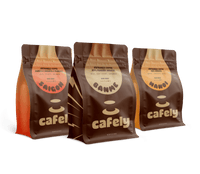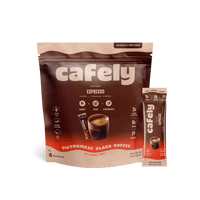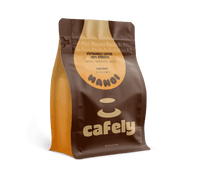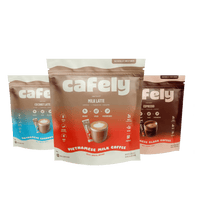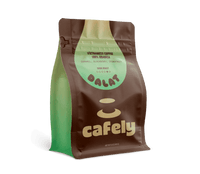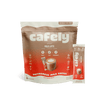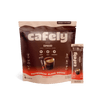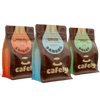So, you want a boost of morning energy without dosing your body with sugar, caffeine, and whatever they add to make the drinks that odd, fluorescent color. Luckily, you don’t have to experiment with odd “diet” drinks to find the perfect healthy energy drink.
In this article, we’re going to break down the science behind what gives us energy, what we should look for in healthy beverages, and more.
What to Look for in a Healthier Energy Drink
The energy drink’s ingredients can have a significant impact on how it affects your body.
Here are some common things to look out for and ingredients to avoid:
1. Natural Caffeine Sources
If you do want caffeine, look for an option that contains it from a natural source, such choices as coffee, green tea, or yerba mate, which contains a similar amount of caffeine to a standard cup of brewed coffee. Organically-produced coffee, for instance, is rich in antioxidants, and you can be sure that the farmer didn’t use man-made chemicals in the production process.
When it comes to coffee compared to tea, both offer natural sources of caffeine and antioxidants — but the caffeine level in coffee is typically higher, making it a stronger pick-me-up.
If a drink contains extracts of tea or coffee instead of chemically synthesized caffeine (like in most popular energy drinks), you may be getting some “bonus” antioxidants compared to the competition.
However, consuming too much caffeine (above the 400 mg daily limit from the FDA) may lead to cardiovascular issues, jitters, and unnecessary stress. If you’re pregnant or have a heart condition, you should avoid it altogether.
2. Low or No Sugar

Sweeteners are something of a minefield in the world of healthy eating, since regular sugar adds so many calories. However, sweeteners often get a bad rap, as sugar is an essential part of your daily diet.
However, the type of sweetener is important. Look for energy drinks that utilize naturally sweet ingredients, such as honey or monk fruit extract. That way, you’re getting the sweetness you crave while also potentially getting some additional benefits from the natural properties of these ingredients.
3. Essential Nutrients
There are several basic vitamins and minerals that your body needs, and you may be lacking a few in your diet. Consuming a nutrient-dense diet could help you feel more energized. For example, zinc and vitamin D can contribute to a slight boost in mental performance and alertness.
If you want to give your body a boost, consider looking for a drink with added magnesium. Many people — particularly those who follow a plant-based diet — don’t get much magnesium in their day-to-day lives. A magnesium deficit means your muscle and bone function isn’t fully supported, potentially leading to fatigue.
Look for energy drinks that contain added vitamins, minerals, and electrolytes — electrolytes are salts that can help you get hydrated more effectively.
4. No Artificial Additives or Other Harmful Ingredients
Artificial additives (coloring, preservatives, and flavorings) can have several unintended consequences for our well-being. If you want to consume entirely clean, natural food and drink, steering clear of artificial colors, flavors, and preservatives is a must.
Generally, additives to food are only legally allowed if they don’t have a huge impact on the health of the consumer. However, when certain ingredients are regularly consumed and the amount in someone’s body increases, side effects may occur.
What’s the Healthiest Energy Drink?
Though energy drinks can give you that little boost you need to get more done, most are not particularly healthy.
They’re typically high in sugar, caffeine, and other ingredients that can be harmful. In fact, studies have found that consuming energy drinks regularly can be dangerous to the user [1].
So, what options do we have beyond the mass-produced, chemically constructed energy drinks? Here are some natural options that can boost energy in a cleaner, purer way than strong energy drinks do.
1. Coffee
Which energy-boosting drink do people turn to in the morning? Coffee.
It’s packed with caffeine and antioxidants — compounds that work together to aid focus and energy levels. For the best results, look for premium beans from organic farms.
Not only will they taste the best, but they’re also more likely to have a diverse range of beneficial compounds within them.
Specifically for energy boosts, you’ll want to choose a coffee with high levels of caffeine, like robusta blends. This species can have up to double the amount of arabica, fully waking you up.
2. Enriched Coffee
Coffee is impressive on its own, but it may be worth looking into the world of coffee that’s been “souped up.” For instance, ginseng and L-theanine can work in tandem with the caffeine in coffee to boost your mental clarity and alertness.
Check out Vietnamese Instant Coffee 2.0.
3. Green Tea, Particularly Matcha

Green tea is another excellent natural source of caffeine, and matcha is a subtype of green tea that leads the pack in this regard. The caffeine content also tends to have less of a “kick” than the caffeine in coffee, gently lifting your energy levels and then lowering you back down.
4. Fruit Juice, Smoothies, and Protein Shakes
Making smoothies or protein shakes in the morning can be a great way to get a lot of vitamins and natural sugars into your system quickly, leading to an impressive energy boost!
Protein shakes are beneficial for long-lasting energy and feelings of fullness. They are particularly prized because they combine protein, fats, and natural carbs to create a nutritionally complex drink. This can offer slow-release energy and nutrition throughout the day.
As with everything, moderation is key. Fruit is full of natural sugars, so you’ll want to carefully portion out the amounts you drink every day.
5. Herbal Teas
Herbal teas can have a soothing flavor and aroma that helps to calm you down and get you “in the zone.” In addition to this meditative helping hand, they can also contain helpful compounds.
For example, rosemary tea may help some people boost their memory, aiding focus and concentration.
6. Coconut Water
Coconut water, the liquid found inside a coconut, has a delicious flavor and creamy consistency. In addition to its flavor, it’s prized as an energy booster due to its high content of natural electrolytes and its significant hydration benefits. These factors can work together to have great energy-boosting potential.
7. Chia Seed Water
Chia seed water is made by soaking chia seeds, which makes them swell and become almost gel-like. The seeds are renowned for having plenty of fiber and omega-3s in them, which, when combined with the hydration from the water they’re soaked in, can give you a potent, slow-release energy boost.
What Are the Downsides of Energy Drinks?

While energy drinks can put some pep in your step, they can also take a toll on your system, even if it might take a while for you to notice. Caffeine is one of the main risks associated with energy drinks, as these prepackaged options can contain a high amount of synthetic caffeine.
The exact impact energy drinks can have on your body is hard to define. However, there are some consequences to any form of energy drink use that are very concerning [1]:
- Cardiac arrhythmias
- Neurological and behavioural changes
- Acute organ inflammation
- Dermatitis
- Autoimmune disorders
Thankfully, the negative impacts of energy drinks tend to come from excessive consumption — it’s possible to avoid these harmful effects by reducing your intake. The FDA suggests consuming no more than 400 mg of caffeine per day. They also suggest capping energy drink intake to one can per day.
Keep your intake well below this, and you should be okay.
How Can You Boost Your Energy Without Energy Drinks?
In moderation, energy drinks can be perfectly healthy, and we don’t want to turn you away from them. However, there are some great alternatives that you could try instead.
Here are some ways you can improve your energy levels, potentially skipping the energy drinks altogether:
1. A Healthy Diet
Eating whole, balanced meals helps keep your energy steady from morning to night. Include foods like fiber-rich carbs (oats, quinoa, sweet potatoes), healthy fats (avocados, nuts, olive oil), and a solid protein source at every meal.
Try to incorporate varied food throughout the week — adding leafy greens, berries, and other antioxidant-rich foods to fuel yourself with healthy, natural foods that keep you moving.
Adding appropriate levels of protein is a good way to sate hunger pangs for a long time, as well as encouraging good mental function. Whole food protein sources like meat, eggs, and legumes also provide additional fiber, vitamins, and minerals.
2. Regular Exercise
Regularly engaging in exercise that raises your heart rate is a great way to increase the level of endorphins in your system. These endorphins can give you an energy boost, plus regular exercise will increase your overall fitness level, which can itself help you get more energy.
3. Good Sleep
Maintaining a healthy sleep cycle is vitally important to maintaining good energy levels. A regular sleep cycle that incorporates deep sleep appears to enhance your body’s ability to make ATP, a molecule it uses for energy.
4. Taking Breaks
Taking breaks during a draining or otherwise strenuous task is a good way to feel a little refreshed. This is especially effective when combined with refreshments, such as a glass of water or a handful of peanuts, to provide a small energy boost.
7. Supplements
The best way to have a consistently great energy level is to ensure you’ve got a good balance of key vitamins and minerals. If you can’t quite get everything from your diet, supplements can be a handy booster.
For energy, some popular options are vitamin B12, vitamin D, iron, magnesium, and zinc. To be on the safe side, ask your doctor before taking any supplements to check they won’t adversely impact any other medication you may be taking.
8. Staying Hydrated
Let’s not forget the most important “energy drink” there is — water. Staying hydrated is the cornerstone of mental clarity and focus, since almost all natural processes going on in your body require water to some extent. By keeping on top of hydration, you can give your synapses a helping hand in firing signals through your brain.
FAQs — The Healthiest Energy Drinks
Want to learn more about healthy energy drink alternatives?
Check out the answers to the frequently asked questions below…
1. What Should You Look for in an Energy Drink?
This may be down to some trial and error and personal choice on your part, but a good rule of thumb is to aim for low-sugar options with a caffeine content of around 80 to 100 mg. That’s around the same amount of caffeine in a cup of black coffee, so it’s likely something that you’re already accustomed to.
2. What Does Taurine Do in Energy Drinks?
Taurine is a key amino acid in your body, which means it has roles in a number of systems. However, it’s added to energy drinks because it helps with energy production in your system, so it may give you a boost.
3. What Are Nootropics in Energy Drinks?
Nootropics, nicknamed “brain boosters”, are a category of compounds that can help boost mental performance and memory. Some common ones include caffeine, B vitamins, and selenium.
4. What Vitamins Are Usually in Energy Drinks?

B vitamins are the most common vitamins in energy drinks, particularly B3, which is also called niacin. This is added to energy drinks because it can help the body break down energy from food.
5. What Is the Healthiest Energy Drink?
Of course, the exact brands available will differ depending on where you are in the world, but healthier energy drinks tend to be ones with minimal added sugar, a moderate caffeine content, and largely natural ingredients. Some popular brands are Tenzing, Zevia, and Celsius energy drinks.
6. What Is the Best Natural Energy Drink?
The outright best will depend on your personal tastes, but Celsius energy drinks commonly score highly when different drinks are compared. They contain no sugar or preservatives, making them a “cleaner” choice.
7. What Is the Unhealthiest Energy Drink?
Some of the unhealthiest energy drinks include Monster, Rockstar, and Full Throttle. These are all loaded up with sugar, up to 54 g per can, and caffeine levels. Though they can spike your energy fast, they often lead to crashes, jitters, and long-term health concerns.
8. Which Energy Drink Is the Best for Health?
Aim for an energy drink low in sugar, with a moderate caffeine level. The vital thing to remember is that energy drinks are part of a balanced diet. Therefore, the energy you get from food should be supplemented by energy drinks, rather than replaced by them.
9. What Foods Are Good for Fatigue?
You’ll want to eat a healthy balance of foods like spinach, oats, eggs, bananas, nuts, and fatty fish like salmon. These provide steady energy through fiber, protein, healthy fats, and key nutrients like iron, B vitamins, and magnesium to keep your body fueled and mind alert.
10. How Can You Boost Energy Naturally?
You can "soup up" your energy levels in several ways. For a short-term boost, a cup of coffee or a banana can be ideal. For a more general increase, regular exercise and good sleep are very useful.
References:
- Costantino, A., Maiese, A., Lazzari, J., Casula, C., Turillazzi, E., Frati, P., & Fineschi, V. (2023). The Dark Side of Energy Drinks: A Comprehensive Review of Their Impact on the Human Body. Nutrients, 15(18), 3922.
- Curran, C. P., & Marczinski, C. A. (2017). Taurine, Caffeine, and Energy Drinks: Reviewing the Risks to the Adolescent Brain. Birth Defects Research, 109(20), 1640.
